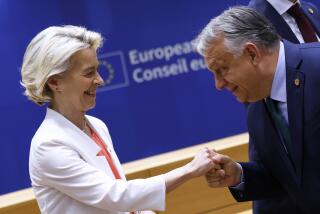U.S. Must Not Sit Still to a ‘Hyperactive’ Gorbachev
- Share via
Recent hints from the White House that President Reagan will journey to Europe this spring, six weeks before his Moscow summit with Mikhail S. Gorbachev, come as good news.
If realized, it would offer the best way to allay renewed concerns in the North Atlantic alliance about U.S. commitment to defend Western Europe and challenge the Soviet arms-control public-relations drive.
Yet, the presence of the U.S. leader in allied capitals will not do this job all by itself. If Reagan is to succeed, his trip must be preceded by intensive discussions between Washington and its friends about the future of defense arrangements as well as the common approach to arms control. Problems that the United States now faces with its military bases in Spain should serve as a reminder that fragile consensus within NATO on a number of important issues is not likely to withstand future Soviet initiatives without a united Western approach to arms control in Europe. Unfortunately, this is happening at a time when the Administration has to respond actively to other important Soviet moves in other areas of the world.
In his New Year’s greetings to the American people, Gorbachev made it amply clear that he intends to remain as pushy as ever. Not only does he hope to sign a treaty with Reagan limiting strategic arms by 50%, but also would like--as he put it, “without delay”--to address the problem of cutting back “drastically” conventional forces and arms in Europe.
Asia got its share of Soviet New Year attention too. After his surprising visit to Afghanistan last week, Soviet Foreign Minister Eduard A. Shevardnadze declared that Moscow hopes to remove its troops by the end of this year. Shevardnadze also indicated that the withdrawal would not depend on the creation of an acceptable transitional government in Kabul. While several important issues still remain to be negotiated, the Kremlin seems to be talking real business this time.
Gorbachev’s political hyperactivity is fueled by these basic reasons:
--He needs successful foreign policy as an insurance against any unexpected turns in domestic developments. This year will be especially important for him. As of Jan. 1, 60% of all industrial enterprises in the Soviet Union came under a new law of self-financing that threatens bankruptcy to unprofitable losers. Nobody really knows what will come out of it.
--The Soviets, however, seem to be much more optimistic about the prospects of their foreign policy. It was especially apparent in a speech delivered by Soviet Deputy Foreign Minister Anatoly G. Kovalev at a conference of the secretaries of the Communist Party organizations of Soviet institutions abroad, published in the Foreign Ministry’s digest, Vestnik.
Kovalev made it abundantly clear the Soviet Union is intensively pursuing goals in other areas of the world that might eventually affect U.S. national interests. This is especially true in Europe and Asia where--by Kovalev’s account--”for the first time the opportunity is being presented to merge the efforts of the states and peoples of the two continents . . . into a single Eurasian process.” The Kremlin obviously hopes that this vainly hidden theme of “Europe for the Europeans” and “Asia for the Asians” could gradually weaken U.S. influence and open for Moscow the doors to attractive technology and markets on the two continents.
Improved U.S.-Soviet relations are expected to accelerate this process and Gorbachev is ready to make use of this situation. He is working especially hard to lure West Europeans into a “common European home” with Soviet and East European communists. While the skeptics in the United States might have reasonable doubts. Moscow thinks otherwise.
Moscow is equally optimistic about the prospects of its policy in Asia. As Kovalev put it, the Soviet Union is now cutting through a “window to Asia and the Pacific Ocean” as it cut through a “‘window to Europe” at one time.
--Moscow’s optimism about the future of its foreign policy is reinforced by newly acquired flexibility. Having recognized grave problems that their country faces, Kremlin leaders are now ready to let Gorbachev resort at times to substantial concessions from former Soviet hard-line positions. They expect that such an approach will either induce the West into productive negotiations or keep it off balance.
Some claim that no Administration, including Reagan’s, can expect to be very effective in many foreign policy areas at once during its final months in office. But with Gorbachev in the Kremlin, it might be easier for the United States to learn how to remain active in foreign affairs even during pre-election times than to face unpleasant consequences of old habits in new times.
More to Read
Get the L.A. Times Politics newsletter
Deeply reported insights into legislation, politics and policy from Sacramento, Washington and beyond. In your inbox twice per week.
You may occasionally receive promotional content from the Los Angeles Times.










